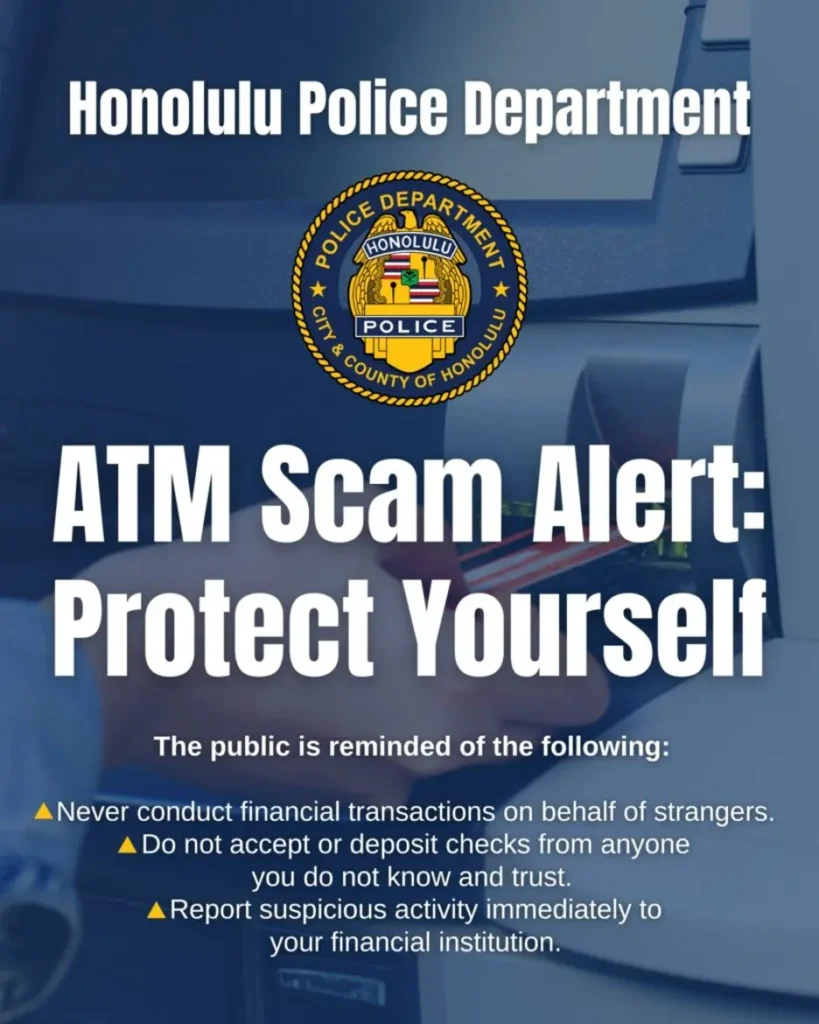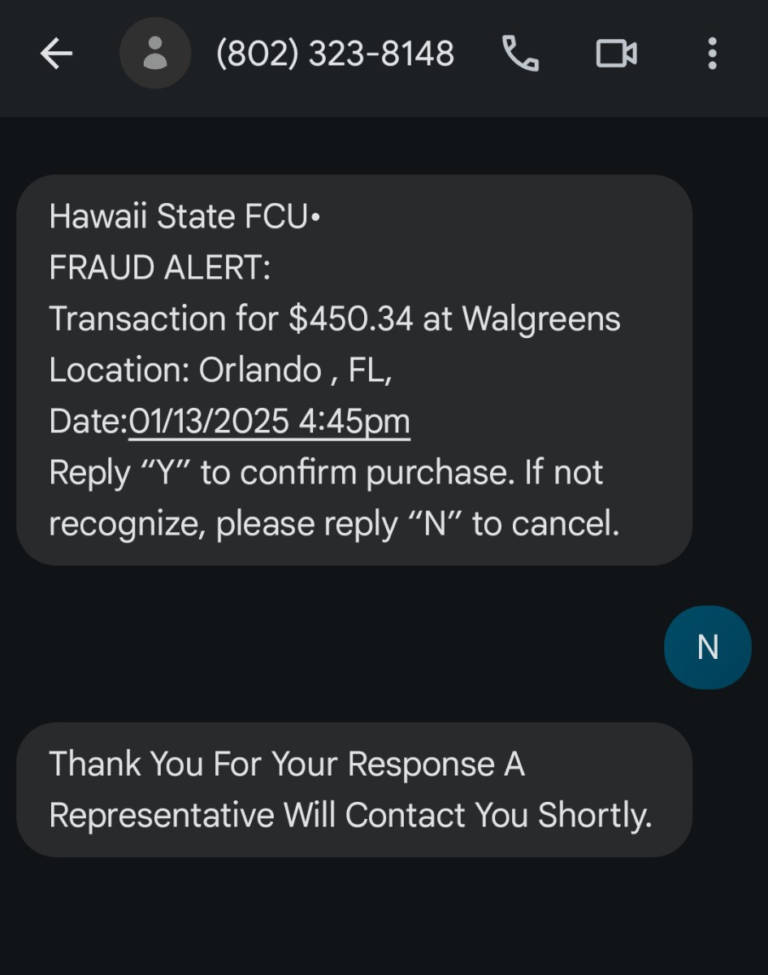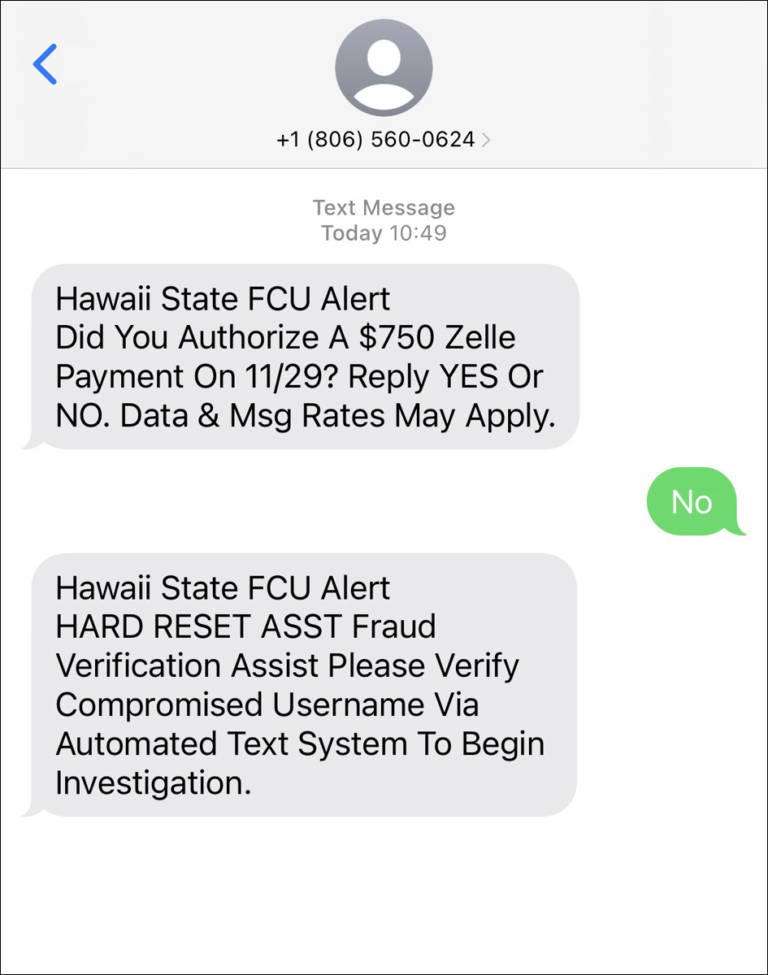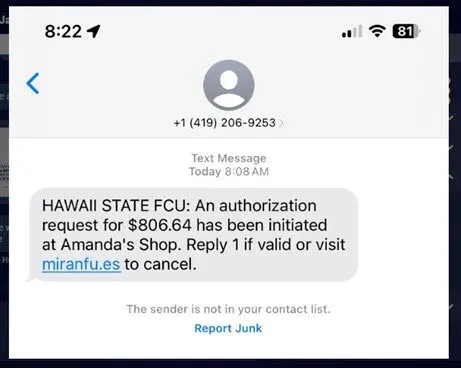February 10, 2026: IC3 Public Service Announcement
The FBI is reporting that a scam in which fraudsters pose as financial institution employees and attempt to obtain/steal bank cards with “chips” is once again on the rise. Remember, Hawaii State FCU will NEVER ask members to mail cards back to us for any reason. See full alert.
The Hawaii State Judiciary and the Hawaii Department of Transportation are warning the public about fraudsters sending phishing links via email or text message.
These messages that allege they are from the Department of Motor Vehicles (DMV) ask for personal information and debit or credit card details, often saying urgent action is required to avoid penalties like license suspension or registration cancellation. These messages are fraudulent.
This scam has been confirmed by the following Hawaii government agencies:
Key reminders:
If you receive one of these messages:
Mail theft is on the rise, and it can lead to serious consequences, including identity theft or financial fraud. Criminals commonly target mail to steal checks, debit and credit cards, and personal information that can be used to access your accounts or open new ones in your name.
Remember to always retrieve your mail promptly and avoid leaving it in your mailbox overnight. You may also want to consider using a locked mailbox or P.O. Box for added safety, or consider going paperless with eStatements.
Mail theft is a federal crime. If you suspect your mail has been stolen, call law enforcement to file a report and contact the U.S. Postal Inspection Service hotline at (877) 876-2455 to file a complaint about the suspected mail fraud. You can also file a complaint online at www.uspis.gov/report.
If you see any suspicious or unusual activity on your account(s), immediately contact the Hawaii State FCU Member Service Call Center at (808) 587-2700 or U.S. Toll-Free at (888) 586-1056 to report the incident.
We have received reports of a new scam targeting victims using ATMs. Individuals are approaching people at ATMs asking them to deposit a check in exchange for cash. The scammers often share a sob story or claim an urgent emergency, offering a generous “cash tip” as an incentive to help.
How the Scam Works:
· The scammer provides a check for $500 and asks the customer to deposit it into their account.
· The ATM receipt appears to show the funds have been added.
· The customer then withdraws $500 in cash and gives it to the scammer.
· In return, the scammer gives the customer $100 as a “thank you” for their assistance.
Within a day, the deposited check is returned because it was drawn on a closed account. The customer ends up losing $400 from their own account.
Remember, NEVER conduct financial transactions on behalf of strangers. Do not accept or deposit checks from anyone you do not know or trust. If you suspect you are a victim of fraud, immediately contact the Hawaii State FCU Member Service Call Center at (808) 587-2700 or U.S. Toll-Free at (888) 586-1056 to report the incident.

We have received reports of a new type of scam in which fraudsters are texting, then calling members posing as Hawaii State FCU. The scammers first send a fraudulent text asking the member to confirm if they conducted a debit card or Bill Pay transaction. When the member responds “NO,” they receive a second text notifying them that a representative will be contacting them shortly.
The scammer then calls or texts the member, asking for sensitive information such as online banking credentials, credit or debit card information, or other personal information, under the guise of reporting the fraudulent transaction. Once they obtain the sensitive information, scammers then attempt to transfer funds out of the member’s account.


Remember, Hawaii State FCU will NEVER call, text or email you asking for sensitive information, including online banking credentials, account numbers, passwords, or other personal information. If you receive a suspicious text, call or email, do not click on any links or provide any personal information. Use Digital Banking or call our Member Service Call Center at (808) 587-2700 or U.S. Toll-Free at (888) 586-1056 to check if there has been any unauthorized activity on your account(s). If you suspect you are the victim of fraud, contact Hawaii State FCU immediately to report it.
We have received recent reports of scammers sending fraudulent texts posing as Hawaii State FCU. These texts are designed to create a sense of urgency, asking people to verify a large transaction they did not make and providing a fraudulent link or phone number to “cancel” the transaction. Upon clicking the link, you are taken to a malicious site; calling the phone number will connect you to a fake credit union representative.

Hawaii State FCU will NEVER send text message notifications that contain links. If you receive a suspicious text, call or email, do not click on any links or provide personal information. Use Digital Banking or call our Member Service Call Center at (808) 587-2700 or U.S. Toll-Free at (888) 586-1056 to check if there has been any unauthorized activity on your account(s). If you suspect you are the victim of fraud, contact Hawaii State FCU immediately to report it.
We’ve received an increasing number of Fraud Notification Reports regarding an Imposter/Phishing Scam targeting our members, posing as a representative from HSFCU. In this scam, individuals are contacting members via phone calls, text message, and emails. Messages indicate a large card purchase or other suspicious activity detected on the members debit card or account records. Messages ask to validate card information, OLB username, and to provide the one-time passcode (OTP) sent to the member. In a few cases, devices from IP addresses located in FLORIDA have been detected.
In this scam, individuals pretending to be representatives from HSFCU Fraud Department, are contacting members via phone calls, text message, or emails. They claim there has been suspicious activity detected on the members account and request sensitive information such as Card and CVS numbers, passwords or OLB credentials and personal identification details.
Several members have also reported receiving calls and voicemails regarding American Airlines charges. Message claims the airlines in trying to withdrawal from the members debit card or requesting to validate card information for a charge from American Airlines.
We were made aware of a scam involving imposters posing as Hawaii State FCU employees, calling and alerting members that there are errors on their account and requesting digital banking credentials, personal and account information. These scammers are able to make the calls look like they are coming from our Member Service Call Center’s line, (888) 586-1056, which led some members to believe these calls were legitimate.
We were made aware of a scam involving imposters posing as Hawaii State FCU employees, calling and alerting members that there are errors on their account and requesting digital banking credentials, personal and account information. These scammers are able to make the calls look like they are coming from our Member Service Call Center’s line, (888) 586-1056, which led some members to believe these calls were legitimate.
By far, the most common type of fraud is the imposter scam.
Imposter Scams involve fraudsters posing as representatives or employees of banks, credit unions, or other trusted organizations. These scammers often contact you via phone, email, or text message, pretending to be someone you know or trust, such as a bank employee, government official, or charity representative. They may claim there’s an urgent issue with your account, request personal information, or ask for your debit or credit card information. Their goal is to deceive you into sending money or revealing sensitive information, which they then use for financial gain.
What to do: Always be cautious of unsolicited requests for personal information or money. Verify the source by contacting the organization directly using known contact details, and don’t trust caller ID alone. Avoid making quick decisions under pressure and never send money or gift cards to unknown recipients. Keep in mind that government officials and agencies would never call you about official business or ask you to wire money or purchase gift cards.
Phishing is a scam that uses fraudulent emails, phone calls, or text messages to trick consumers into disclosing sensitive information, such as credit card numbers, bank account details, Social Security Numbers, and passwords. It is a common form of social engineering where attackers impersonate legitimate companies, banks, credit unions, or organizations to deceive victims and commit identity theft for financial gain.
What to do: Be cautious of unsolicited phone calls or messages asking for personal or banking information. Legitimate financial institutions will never ask for online banking credentials or personal confidential information over the phone or through messages.
Do not click on links or attachments in messages from a number that you don’t recognize. Do an online search to verify the website or phone number yourself and contact the entity to confirm the validity of the email or text you received.
Another common form of online banking fraud, identity theft occurs when a criminal obtains or uses the personal information, e.g., name, password, Social Security number (SSN), date of birth, etc., of someone else to assume their identity or access their accounts for the purpose of committing fraud, receiving benefits, or gaining financially in some way.
What to do: Do not give your personal information to someone who calls, emails, or texts you. It could be a scammer trying to steal your information. Frequently review your bank account and credit card and statements. If you notice anything unusual, such as unfamiliar transactions and charges report it immediately to your financial institution.
If you become a victim of identity theft, this step-by-step Identity Fraud Recovery Checklist will help you through the reporting and recovery process.
These scams start with great news: You’ve won a prize. There’s a catch. They will ask you to pay money or provide an account number upfront for fees and taxes before you can claim the prize. An account number can allow a criminal to siphon money out of your account, and money paid to collect your prize is gone forever.
What to do: Ignore any emails saying you won a foreign lottery. And if you didn’t enter a contest in the first place, know that you didn’t win. Real sweepstakes are free, by chance and almost always require you to enter to win.
Romance scammers create fake profiles on dating sites and apps or contact you through popular social media sites. You meet someone special on a dating website or app. Soon they want to email, call, or message you off the platform. They say it’s true love, but they live far away — maybe for work or because they’re in the military. Then they start asking for money. Maybe it’s for a plane ticket to visit you. Or emergency surgery. Or something else urgent.
What to do: Be smart about who you connect with and what information you share online. Never send money to someone you don’t know, even if they’ve professed their love to you. Never share sensitive personal information, such as bank account or credit card numbers, Social Security number, with a new love connection.
Charity scams deceive people into donating to fraudulent or misrepresented charitable causes. Fraudsters will often time these scams to coincide with natural disasters, such as wildfires, hurricanes or floods, exploiting the urgency and vulnerability of affected individuals and communities. These scams can take many forms, including traditional online donations and fundraisers, and crowdfunding (i.e. GoFundMe).
What to do: Be alert for overly emotional charitable appeals that say little about what the charity intends to do with your donation. Do not give in to the sense of urgency and the excessive pressure – take time to do your own research before you donate. You can verify an organization’s authenticity through platforms like the Better Business Bureau’s Scam Tracker, Charity Navigator, Charity Watch, or the IRS Tax Exempt Organization search tool.
Government scams are when scammers pose as government officials and attempt to steal your personal information.
Social Security scams: Scammers pose as officials from the Social Security Administration and send you a realistic-looking email with a fake statement for you to download and review. Upon clicking the attachment, malicious software is installed on your device. The scammer then gains full access to your computer, allowing them to steal your personal information.
For more information, please refer to this April 2025 Social Security Administration (SSA) Scam Alert.
IRS scams: Fraudsters impersonate an IRS official, calling and demanding payment for unpaid or overdue taxes. They often use intimidation or threats of jailtime to frighten victims into providing banking or card information to facilitate payment.
What to do: Never click on links or download attachments from unexpected emails, especially if they claim to be from a government agency. When in doubt, go directly to the official government department website or contact them through verified channels. Also remember that the real IRS will never call you to demand payment or request personal information. If you receive a call demanding payment, hang up immediately.
Including your Digital Banking credentials, account numbers, passwords, or multi-factor authentication (MFA) one-time passcodes.
They can even spoof caller IDs to appear as "Hawaii State FCU" or "HSFCU." If you receive an unsolicited request for sensitive information, hang up or ignore the message. Stay cautious and never share personal details.
Contact us directly using our official contact information. You can also find official contact information on your account statements.
If you feel like you may be a victim of a scam, immediately call Member Service Call Center:
If you received a suspicious email or scam, please forward it to our response team.
Do not change the email subject line or copy in any way, and delete the email immediately after sending it to us. Do not respond or click on any of the links found within a suspicious email message.